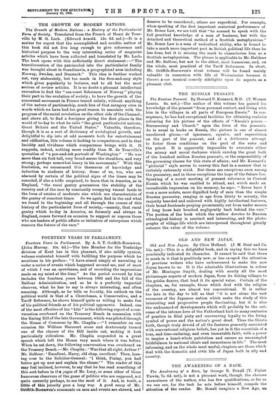THE GROWTH OF MODERN NATIONS.
Thit Growth of Modern Nations: a History of the Particularist Form of Society. Translated from the French of Henri de Tour- ville by M. G. Loch. (Edward Arnold. 12s. 6d. net.)—It is a matter for regret that the accomplished and erudite author of this book did not live long enough to give coherence and historical purpose to the very interesting series of magazine articles which have been collected and translated by Mr. Loch. The book opens with this sufficiently direct statement :—" The transformation of the patriarchal into the particularist family was brought about in Scandinavia, a geographical area including Norway, Sweden, and Denmark." This idea is further worked out, very elaborately, but too much in the free-and-easy style which gives popularity to lectures, and to all but the most Serious of review articles. It is no doubt a pleasant intellectual recreation to find the "sea-coast fishermen of Norway" playing their part in the evolution of society; to have the growth of the communal movement in France traced calmly, without anything of the nature of partisanship, much less of that savagery even in words which we have had too great reason to associate with the progress of the social revolution on the other side of the Channel; and above all, to find a foreigner giving the first places in the world of to-day to what he calls "the great particularist nations, Great Britain and the United States." Valuable, therefore, though it is as a sort of dictionary of sociological growth, and delightful to dip into at odd moments both for entertainment and edification, this volume is lacking in compactness, and in that lucidity and vividness which compactness brings with it. It suggests, indeed, nothing more readily than M. de Tourville's quotation of "a pen-and-ink portrait of Washington." "He was more than six foot tall, very broad across the shoulders, and very strong; perhaps somewhat heavy in his movements." With this limitation, we recommend this thesaurus of knowledge and induction to students of history. Some of us, too, who are alarmed by certain of the political signs of the times may be consoled, if also a trifle surprised, to learn that in America, as in England, " the rural gentry guarantees the stability of the country and of the race by constantly occupying vacant lands in the form of estates of moderate size which are characteristic of the gentry of remotest times. So we again find in the end what we found in the beginning and all through the course of this history of the particularist form of society,—namely, that rural gentry which to-day in America, as formerly and always in England, comes forward on occasion to support or repress those who are leaders of public affairs or initiators of enterprises which concern the future of the race."




















































 Previous page
Previous page